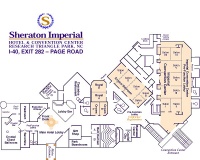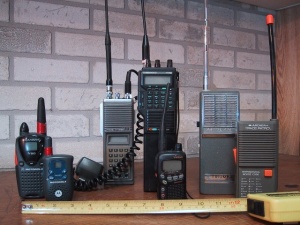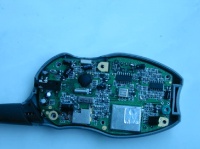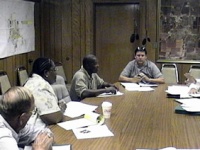User:Cdoane/Convention Security 2
Advanced Convention Security Officer Course
Contents |
Introduction
In the previous course you learned the basics, the bare minimum. This course will attempt to go into more detail. More detail on each post, special situations, More detail on certain knowledge, on the importance of communication, and equipment etc. This is meant as a guide only. Use information at your own risk *grin*.
Chapter 1: VIP Security
A a small note on some advanced information using VIP security as framework for the knowledge, please note much of this information can be used anytime in other volunteer security positions.
One must take into account VIP needs and requests insomuch as they can without sacrificing safety. While these ‘bodyguards’ are limited to what they can do by law, there is still much you can do to assist your principle (the one whom you are protecting). Three things are the most useful. One is to have a lot of information. This is where your imagination comes in. Put yourself mentally at the event and in position. What occurs to you? Perhaps where the exits are? How big is the room? Where are the refreshments and restrooms? How far away is backup or hotel staff? Where is the First Aid Kit? Medical Volunteer? Will you be expected to drive and where? Do you know how to communicate with the other event areas as you may need? Is the VIP you are escorting have a lot of fans you need to be aware of? Are these fans a bit pushy? Is the principle a fandom leader like the MFI IC wherein there may be some attempt to ‘kidnap’ them for fun etc. As an example at a local Renn Faire in Michigan, it was considered great fun to ‘kidnap’ the Queen of the Faire from beneath her guards noses. It should be noted that sometimes the idea is to allow the kidnapping etc. It would be important to confirm with the principle that this is alright as well as making sure one can ID the permitted kidnappers etc so one doesn’t allow an incident by an interloper thinking its ok. Never assume. One would be amazed how having a plan and the right information can make one look great. Having a cheat sheet of who to contact for what, what to do in certain emergencies and even maps for the location of the event can help in general as well.
The second part in VIP Escort is to have a contingency plan for all likely events. What will you do if you get swarmed with people bugging your principle for autographs in manner not proscribed? What is your role if the building is on fire? Or if your principle or someone around you has a medical emergency or concern? By planning these things out in advance one can help prevent ‘freezing’ at a moment of emergency. If you are new, as its easier for an experience event goer to consider the possible problems, please find an experience staffer to ask them about the likely concerns.
The last part is people skills. You will be working with the public, your principle, and other event staff. It will be important to be able to interact with them in a professional and calm manner. This is the reason we are listing communications links on this page and encourage courses in the MFI Academy like the Counselor’s exam and Cell Command. One would be amazed at how not losing ones head with others or in a crisis can help solve a potential problem.
Helpful communications links(please let Christina Doane at maquisgodess-AT-Gmail-DOT-com know if these are out of order or if you have ones that would be helpful to add): http://www.wikihow.com/Communicate-Effectively
http://www.ehow.com/how_2127846_communicate-effectively.html
Chapter 2: General Note On Some Special Situations
Be alert as to the problems that can occur in any given setting. For example outdoor events have the added problem of heat related illness, if done in spring or summer (though illness heat related and otherwise can occur anywhere one should be alert for signs at all times). Before working any event you should try to go over all likely problems and plan for them. Remember not all problems are man made some are Murphy or mother nature but all likely possibilities need to be planned for.
If anything happens, especially unusual, observe and report, usually to your security supervisor. Some of the most likely special situations have been covered above under the heading of their specific job. Generally though if something happens, medical emergency etc, call for help; try not to leave your post, if you are stationary. In most cases if you are near enough to be first responder at a crisis it will be near your post anyway, if not there may be someone closer. Don't assume you are the only one who can help. However if you are, you must use your own judgment. In many events a radio call to the supervisor will have more help then you need sweeping down on a problem. No one wants things to get worse. We can't cover every problem, so as before just stay calm and use common sense. We know we are repeating ourselves but too often people allow emotions to speak for them when what they need is a clear head. Remember in a crisis you represent authority and people will look to you first for professionalism and leadership.
Especially in cases of someone violent, you must be the cooler head, be calm, firm and speak with authority but do not try to 'one up' someone verbally or physically. If you find yourself threatened physically back away and call for help. Usually however by talking calmly and genuinely trying to help the person you will lessen the chances of it becoming violent. Many upset people simply want someone to listen to them and care and may calm down after a rant. In other cases if the person finds they can't 'get to you', they will just stalk off, just give your supervisor the description (yes again with the alertness *grin*) of the trouble patron so they can keep a collective eye open and then continue your duties.
Lost Child:
If a parent comes up to you and informs you that they've lost their child your first step is to get a complete description (name, age, gender, clothing from shoes to top, hair color, eye color etc).
Then put out a lost child call over the radio (if there is more then the security channel in use by the event, you may want to put it out on the main radio channel as well), immediately people will react those in hearing of security radios may even try looking for the child themselves but it is with security reaction we are interested in here. And also another reason why a map of the event could come in handy.
Rovers will check all parts of the event walkways, female and male rovers will check the proper bathrooms as well as all general parts of the event. They will usually be assisted by the gophers.
Entry Point persons will watch for the child at their respective points, especially those at the primary exit points. Note some events may also require a 'shut down'. No one leaves or enters until the all clear is given by the authorized persons (in one Rennie event the authorized persons was the Security Chief or a Medic). Please check on this policy on an event by event basis, it happens a lot and is helpful to know.
Dealer and Event security will all look in their areas. You sense a theme? lol. In short don't leave your post open. There are others who are looking as well, if you leave your position the child may wander right through.
If you reason to believe of foul play, example: The Ex is trying to make off with the kid, call your supervisor IMMEDIATELY. They in turn will pass the news up the chain of command quicker then warp, they will be the ones to call the Police. If you see the child and person in question keep them in sight and make sure police can find them. As always use your judgment, knowledge of the law (example: rules of force, citizens arrest), and knowledge of event rules and you should be fine.
After finding a lost child, inform all security over the radio, this has the added bonus of the parent or guardian is most likely near a security officer and will hear the announcement. Then bring the child to the Central Security Command Center, or what your event has for it for pickup.
This is fairly standard procedure but you will want to check with your specific event for their set up, just in case.
When calling 911 use your judgment, usually at the first sign of a real crime its best to call your supervisor without delay, better safe then sorry. If you are a supervisor it is your responsibility to ensure your people know their duties.
It is impossible to cover everything for every type of event. In summary, one should know the kind of event they are staffing and what is likely to go wrong. Usually experienced staffers will have knowledge of the contingency plans because they've lived through the mistakes, learn from them. If that is not possible one should do their best to know what to do in any likely situation, at the very least one will be given a way to contact their supervisor for help.
Chapter 3: More On Communication And The Radio
Now here's where communication is key. It is important that you try to find out able all possible problems, duties, backup plans etc before taking your post. Also along with checking your gear, asking questions should be tops on your list. It’s also just as important that your supervisors give you a briefing. They will be experienced and will have a good idea how the event organizers like the more common situations to be handled.
You can always ask if you are unsure, don't feel stupid. After all "..The only stupid question is the unasked one" (DS Holcomb). Your preparation before assuming your post will save you a lot of problems later on. Now there is alot of equipment that you will find useful, these were detailed in the previous course but the main one is radios.
Two-Ways (walkie-talkies or two-way radios) are the lifeblood of event communication. It simply is not efficient to have gophers deliver, by hand, every single routine message. So modern VSO's find that a radio is part and parcel with the job.
Radio background information:
A walkie-talkie is a portable, bi-directional radio transceiver, first developed for military use. Major characteristics include a half-duplex (only one can receive and transmit at a time) channel and a push-to-talk switch that starts transmission. The typical physical format looks like a telephone handset, possibly slightly larger but still a single unit, with an antenna sticking out of the top.
"Hand-held transceivers became valuable communication tools for police, emergency services, and industrial and commercial users, using frequencies assigned for these services.
Low-power versions, exempt from license requirements, are also popular children's toys. Prior to the change of CB radio from licensed to un-licensed status, the typical toy walkie-talkie available in retail stores in North America was limited to 100 milliwatts of power on transmit and the 27 MHz citizens' band channels.
Al Gross also worked on the early technology behind the walkie-talkie between 1934 and 1941, and is sometimes said to actually have invented it.
The personal walkie-talkie has now become popular again with the Family Radio Service. FRS operates in the GMRS (General Mobile Radio Service) band, which is also used for business walkie-talkies and mobile radios. While FRS walkie-talkies are popular toys, they are also a useful communication tool for business and personal use." (Radio background information from wikipedia.org).
As you can see from the first Walkie Talkie picture, radios are varied items but most of them will have the following:
- On/Off Knob, usually on top.
- the "Talk" button, usually on the side
- "Channel Select", on the front normally, two buttons that may sometimes have a picture of up and down arrows
- a "Call" Button. The most annoying sound ever. This will 'Beep' all compatible radios on your channel. Usually on front.
- "Volume" Control, usually on front, usually 'plus' and 'minus' signs.
- a View screen on front.
Remember your radios may be more or less complicated then the listing above, be sure to read your directions. Also before bringing private radios to an event for security, make sure they will work with what the security staff is already using.
At events you may run into the problem of private persons with radios and may possible run out of channels. One way event staffs have worked around this problem is the 'sub-channel'.
For example most radios will work from channels 1-14. A Two-way with sub-channels will have 1-4 sub-channels for each of the main channels.
Example: Your Security Staff Supervisor assigns channel 3 with sub-channel 2 so your security channel would be 3-2.
There should be directions with your radio how to do this, if not ask.
This will not completely get rid of non-security personnel but it will help. Also you will want to try to go for radios with 2 mile or more range. Depending on what size events you plan to use them at. Remember wires, buildings etc can cut down on your range.
Also ear pieces (there is usually a plug for them) this will allow you to hear your radio while in noisy conditions, very useful.
What did he say? or Radio etiquette.
You will want to check with your event contacts regarding their specific radio etiquette but here are a few basic suggestions:
- When speaking, hold the radio at least 5-8 inches from your face. This will prevent your voice from becoming distorted.
- Speak clearly and carefully. No need to do a William Shatner but mumbling or speaking rapidly will just get you a lot of 'what did you say?'
- When speaking hold down the "Talk" button for at least one full second before speaking this will ensure the channel is fully open when you begin. Also as soon as you are finished release the button; if you don't you will hold the channel open and no one else can speak.
- Keep chatter to a minimum. The entire security staff doesn't need to know about the latest X-Box game you bought, if something important is happening un-needed chatter will prevent it from being heard.
- Keep things as professional as possible, you never know whose overhearing.
- Always remember to learn all the channels your event will be using, you never know when you might need them. Also note security channels may change constantly, you should keep up on changes.
- A good guiding rule is to ID yourself them whom you wish to speak to and wait until you have their attention.
These are a few of the most common Radio Terms:
Copy or good copy- I understand what you just said, also if given an instruction can mean you understand and will obey. In the second case ‘Copy That’ is usually stated.
Example 1:
Guard one: “watch out for shoplifters"
Guard two: “Copy that"
Example 2:
Guard one: “Meet me in the event room"
Guard two: “Copy That"
Do you Copy? or Come In[insert name here]-Can you hear me, looking for specific person or set of persons.
Example 3:
Guard one: “My shift is over, where is my relief?, Do you Copy?"
or
Guard one: “Come in Supervisor, my shift is over where is my relief?"
Repeat or Say Again-you are repeating or asking to be repeated what just went over the airwaves.
Example 4:
Guard one: “I repeat look for 5’6 female with the free water for the guards."
Example 5:
Guard two: “Say again guard one?"
Out-I understand and am done with this conversation.
Example 6:
Guard one:"Get here soon. Out."
Over-I said something and want a reply.
Example 7:
Guard one: “Will you be here soon, over"
- Note it is unneeded to say 'over and out'. Its difficult to say 'I expect a reply' as well as 'I am done with this conversation'.
Stand by-hold for further transmission, not sure how long it will be.
Example 8:
Guard one:
“Getting information from patron now, stand by."
Wait One-Hold briefly for further transmissions. Usually few seconds.
Example 9:
Guard one: “Let me find the page in question on this table, Wait one."
Sample Conversation:
Guard one-Derrick
Guard two-John
Derrick: "Derrick to John, Derrick to John"(if no answer ‘Come in John’ would be ok or some variation on it.)
John: "John here."
Derrick: "Don’t forget...(blanks out)"
John: “Say again? didn’t copy."
Derrick: “I Repeat Supervisor said to watch for shoplifters, over."
John: “I Copy, Out."
==Chapter 4== SO YOU'RE A SUPERVISOR
These are the big leagues. You’ve proven yourself as an excellent VSO with great leadership qualities. Now what? *grin*.
Leadership is something you will continue to learn as time goes on. There are levels, usually there are shift supervisors, on up. All, however, have a great deal of responsibility. What will be listed below will be things you will want to keep in mind.
Make sure you understand all possible problems and what the event coordinators expect, by now you should have a pretty good idea if this is an event you've worked before and even if its a new event you should have a good idea of what you will need to ask. If not, learning as you go is possible, especially since by now you should have been able to show how well you can think on your feet.
Generally you need to,
Make sure you tour the place in advance, with a member of the senior event staff if possible. Three of the main things you'll want to make sure you discuss are identifing the areas where they will want security and identify what type as well as when they need the security. You will also want to know what equipment you will need. And what they will provide in addition to what you will provide, what’s left will need to provided by the guards themselves.
Especially find out if there are freebies for the guards, this is their only payment and the good ones work hard for it.
Once that’s done you will need to start filling slots, generally there will be some sort of procedure in place for applicants. Some supervisors will check references, some won't. As long as you remember that you’re ultimately responsible for filling every staffing hole and any problems caused by your security people.
So be as careful as you like, it’s your neck. You will need to set shifts. Ideally this could mean 1-2 hour chunks, depending on how many people you have will depend on how many rotations (example after 1-2 hours some rovers could rotate to a stationary post, freeing those people to patrol, this will help prevent your people from becoming bored and listless.) you will need to do. Usually though it is not recommended to work a person more then 8 hours. As stated depending on how short-handed you are will depend on how many hours each person works. And it is not needed that a person work all at once, 2 hours here or there over the course of the weekend will allow the officer to still attend some of the events. At the same time they will be able to fulfill their security duties.
Your are responsible for them, make sure they understand what you want out of them, how you want them to act in certain situations, make sure they are being checked on and have all they need to complete their duties. Many security officers will work harder knowing their supervisor cares and will support them.
You may get a bad seed, depending how bad, you may need to eject them from your staff. If you do just try to learn from the mistake and slowly build a 'reserve force' of people you know you can call on in certain events. These people will tend to know people whom they vouch for and so on.
This can’t be stated enough make sure you tell your people all that you want them to know, don’t assume they will know what to do, especially in unusual situations like a lost child search.
A good idea would be to sit down long before the event and write down a list of what you want them to know. Some Senior VSO's even hold mini training sessions to prep their people. Since its your head how you go about about making sure you have a professional and qualified staff is up to you.
For more on Command Level VSO information please see level 3 of this course in the Leadership Academy. Any corrections or additions should be sent to maquisgoddess-AT-gmail-DOT-com.



